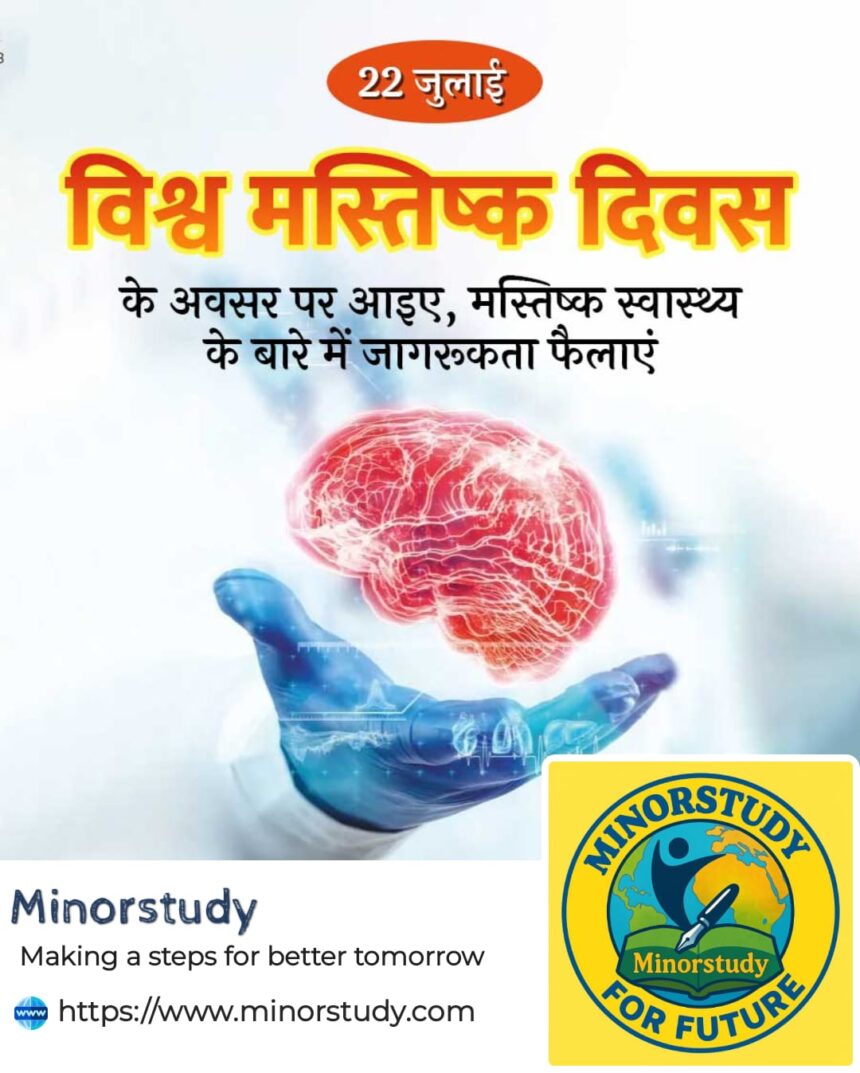Powerful Reasons Why World Brain Day Matters More Than Ever – A Global Wake-Up Call 🧠🌍
The human brain — that miraculous organ of thought, memory, emotion, and control — is arguably the most complex structure in the known universe. Yet, despite its importance, brain health is often overlooked until it’s too late. That’s where World Brain Day steps in: to educate, inspire, and awaken the world to the importance of brain health.
- 📅 What is World Brain Day?
- 🧠 A Brief History of World Brain Day
- 🗓️ Timeline of World Brain Day
- 🧾 Facts About Brain Health That Will Surprise You
- ❓ FAQs About World Brain Day
- Q1: Why is World Brain Day important?
- Q2: Who organizes World Brain Day?
- Q3: Is there a fixed theme every year?
- Q4: How can I participate in World Brain Day?
- Q5: Can brain diseases be prevented?
- 🌍 Global Significance of World Brain Day
- 🎯 Why World Brain Day Is Crucial in Today’s Times
- 🎉 How is World Brain Day Observed?
- 💭 Daily Life Impacts of Brain Health Awareness
- 🧘♂️ How You Can Take Care of Your Brain Daily
- 💐 Wishing Messages for World Brain Day
- 🔑 Key Points to Remember
- ✅ Importance in Society
- 🧠 Conclusion: Brain Health is Human Wealth
Held annually on 22nd July, World Brain Day is more than just a date on the calendar — it’s a global call to action to protect the most vital organ in our body. In this detailed and human-friendly guide, we’ll explore the history, facts, timeline, FAQs, significance, observance, daily life impact, and wishing ideas surrounding this day — in over 1200 words.
📅 What is World Brain Day?
World Brain Day (WBD) is a global awareness campaign initiated by the World Federation of Neurology (WFN), observed every year on 22nd July. The day aims to raise public awareness about brain health, the burden of neurological diseases, and the need for early diagnosis and prevention.
Each year, World Brain Day focuses on a specific neurological condition or theme — such as Alzheimer’s, Parkinson’s, Stroke, Multiple Sclerosis, or Brain Health Equity — helping create targeted awareness.
🧠 A Brief History of World Brain Day
Founded by: World Federation of Neurology (WFN)
First Observed: 22 July 2014, coinciding with the establishment of WFN in 1957
Purpose: To highlight the importance of brain health and reduce the global burden of neurological disorders
Annual Themes: Each year’s theme focuses on a specific brain condition (e.g., Epilepsy, Stroke, Parkinson’s, Multiple Sclerosis)
This initiative has grown to become an international platform, observed by neurologists, caregivers, institutions, and health ministries worldwide.
🗓️ Timeline of World Brain Day
| Year | Theme | Focus Area |
|---|---|---|
| 2014 | Brain Health | General Awareness |
| 2015 | Epilepsy | Managing seizures |
| 2016 | Stroke is a Brain Attack | Stroke prevention |
| 2017 | Migraine: The Painful Truth | Headache awareness |
| 2018 | Clean Air for Brain Health | Pollution impact |
| 2019 | Migraine: The Painful Truth Continues | Public awareness |
| 2020 | Move Together to End Parkinson’s | Parkinson’s disease |
| 2021 | Stop Multiple Sclerosis | MS and disability |
| 2022 | Brain Health for All | Global equity |
| 2023 | Brain Health and Disability | Inclusive awareness |
| 2024 | Brain Health and Prevention | Early detection |
🧾 Facts About Brain Health That Will Surprise You
The brain weighs about 3 pounds (1.3 kg) but uses 20% of the body’s energy.
The brain is made up of approximately 86 billion neurons.
Every 3 seconds, someone in the world develops dementia.
Neurological disorders are the second leading cause of death globally.
Conditions like depression, anxiety, stroke, and Alzheimer’s are on the rise.
90% of brain diseases are treatable if detected early.
A healthy brain contributes to emotional stability, memory, and overall quality of life.
❓ FAQs About World Brain Day
Q1: Why is World Brain Day important?
Answer: It raises global awareness about brain-related illnesses and highlights the importance of early diagnosis and access to treatment.
Q2: Who organizes World Brain Day?
Answer: It is organized annually by the World Federation of Neurology (WFN).
Q3: Is there a fixed theme every year?
Answer: Yes, each year has a different neurological theme — from stroke to migraine to Parkinson’s.
Q4: How can I participate in World Brain Day?
Answer: Attend webinars, spread awareness on social media, consult neurologists, or host educational events in your community.
Q5: Can brain diseases be prevented?
Answer: Many brain diseases can be prevented or delayed through healthy lifestyle choices, mental wellness, and early screening.
🌍 Global Significance of World Brain Day
Global Burden of Brain Disorders: Neurological diseases affect over one billion people worldwide.
Lack of Access: Many low- and middle-income countries have limited access to neurology specialists.
Mental Health Connection: Brain health is directly linked to mental well-being and economic productivity.
Stigma Reduction: It helps break taboos around conditions like epilepsy, schizophrenia, or dementia.
Policy Advocacy: Governments are encouraged to invest in neurology infrastructure and research.
🎯 Why World Brain Day Is Crucial in Today’s Times
In a fast-paced digital world, the brain is under constant stress, screen exposure, unhealthy routines, and mental overload. Today, we’re seeing increasing rates of:
Digital fatigue
Sleep disorders
Cognitive decline at earlier ages
Chronic depression and anxiety
World Brain Day acts as an annual reminder to slow down, take charge, and invest in your mental capital.
🎉 How is World Brain Day Observed?
🌐 Globally:
Virtual webinars and symposiums by health organizations
Research publications and launches
Awareness campaigns on social media
Collaboration with WHO, UNICEF, Alzheimer’s Org, MS Society
🇮🇳 In India:
Hospitals conduct free neurology checkups
Awareness sessions in schools and colleges
Government bodies promote the theme via public health advisories
Doctors and mental health advocates give public lectures
💭 Daily Life Impacts of Brain Health Awareness
Promotes early health checks for symptoms like memory loss or headaches
Encourages adoption of brain-friendly habits: better sleep, mindfulness, hydration
Helps reduce accidents and trauma through awareness of stroke and seizure signs
Educates families on caring for elderly patients with Alzheimer’s or Parkinson’s
Empowers youth to take charge of mental clarity and performance
🧘♂️ How You Can Take Care of Your Brain Daily
Exercise regularly – improves memory and reduces risk of dementia
Eat brain-boosting foods – like walnuts, berries, turmeric, and leafy greens
Practice mindfulness or meditation
Avoid smoking and limit alcohol
Stay mentally active – puzzles, reading, new skills
Sleep well – 7 to 9 hours is non-negotiable
Socialize – human connection is brain nourishment
💐 Wishing Messages for World Brain Day
🧠 “Let’s honour the powerhouse of our body — our brain — by taking care of it. Happy World Brain Day!”
💡 “Smart is not just intelligence, it’s brain health. Wishing you clarity, strength, and mental peace this World Brain Day.”
🌍 “On World Brain Day, let’s spread awareness and support each other in fighting brain diseases. Knowledge is power.”
🔑 Key Points to Remember
Observed every 22nd July
Started by the World Federation of Neurology
Focuses on one neurological issue every year
Addresses both brain diseases and mental health
Awareness and early prevention are the pillars
Affects billions of lives worldwide
✅ Importance in Society
Reduces healthcare burden through awareness and prevention
Fosters a healthier, more productive population
Breaks societal stigma around brain and mental illnesses
Encourages neurodiversity and inclusive policies
Helps create better caregivers and compassionate citizens
🧠 Conclusion: Brain Health is Human Wealth
In the rush of life, we often forget the engine that runs it all — our brain. World Brain Day is not just about scientific facts and doctor talks. It’s about recognizing, respecting, and restoring our inner power. Whether you’re a student, professional, parent, or elder — your brain deserves care and celebration.
This 22nd July, let’s not just observe the day — let’s pledge to keep our minds strong, clear, and compassionate.
“A healthy brain is the foundation of a fulfilled life. Let’s build it — together.”








